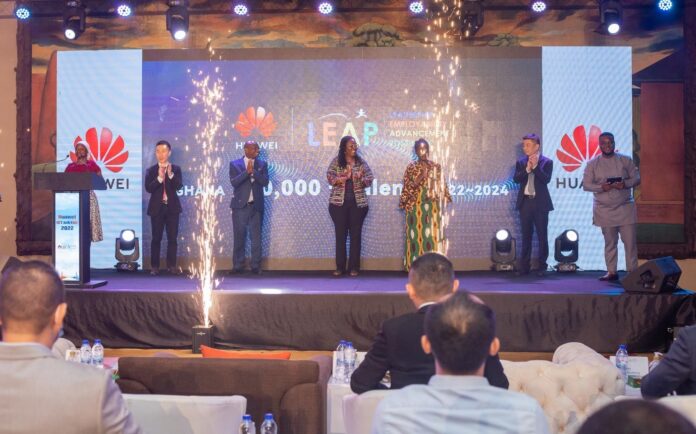
Huawei has launched its LEAP digital skills development program. Announced at its maiden ICT Job Fair, LEAP aims to develop of more than 100 000 ICT talents for the ICT sector.
LEAP which is an acronym for Leadership, Employability, Advancement and Possibilities, is aimed at fostering strong digital leadership and a skilled ICT workforce, building a digital talent pool, and promoting digital literacy among citizens. It includes a wide range of activities spanning from ICT training and certification courses, government digital capacity building, Women in Tech digital literacy drive and ICT skills competitions.
Launching the LEAP programme in Ghana, Huawei Southern Africa Vice President, Yang Chen stressed the importance of ICT skills transfer and talent development and underlined Huawei’s consistent emphasis on it.
“Digitization is deeply rooted in people. Because we digitize for people and by people. When roots are deep, there is no need to fear the wind,” he said. “Through the programme, we strive to cultivate more youth leaders in ICT for Ghana, who can explore more possibilities.”
Since the introduction of the Huawei ICT Academy in Ghana, Huawei has helped advance the ICT skills of more than 7000 university students through professional ICT Certification courses to prepare then for industry. About 50,000 women have also benefitted from the women in tech digital literacy program. These initiatives coupled with others including the seeds for the future and professional ICT skill workshops for civil servants and industry partners has helped increase youth employability and bridge the gender gap in the ICT industry.
The Managing Director of Huawei Ghana, Mr. Tommy Zhou highlighted Huawei’s commitment to Ghana regarding the LEAP initiative. He further reiterated Huawei’s preparedness in achieving the set targets by saying “these commitments are not just words. They are possible because we have invested a lot into teacher education, training facilities and content development, with over 3000 courses under 5 catalogs, spanning from 5G, AI, Cloud and IoT, to big data and cyber security accessible to Ghanaian Students.”
Speaking at the ceremony, Ursula Owusu-Ekuful, the Minister for Communications and Digitalisation said, “The Digital Transformation Agenda of government aims at harnessing the power of technology to transform the economy and ensure that everyone enjoys the benefits associated with digitalisation, and no one is left behind.
This calls for equipping young people as well as motivating individuals across the digital divide with the digital skills they need to thrive in the 21st century” She also commended Huawei for the initiative adding that, “employment creation through direct jobs and entrepreneurship in ICT is part of the focus of the digitalisation agenda, hence the launch of the Huawei LEAP initiative through the Huawei ICT Job Fair fits into the digital transformation strategy of the Government, thus necessitating the full backing and cooperation of Government the industry players.”
The Deputy Minister of Education, John Ntim Fordjour, said “technological advancement continue to reshape our world and countries that do not embrace this will be left behind. It is therefore important that as a country we prioritize STEM education to take advantage of the numerous benefits it presents to both the citizens and the economy as a whole.”
On the Ministry’s partnership with Huawei he noted, “We are currently working with Huawei through their ICT Academy initiative to include their Professional ICT Certified Courses as part of the TVET Training.
“We are also in discussion with some Universities and Tertiary institutions to embed the Huawei Certifications in their curriculum especially for students in Engineering and the sciences. We hope that through these initiatives, our students will graduate with the necessary skills needed by industry to increase their job opportunities and even help them create jobs for themselves and others.”
According to a study by the International Finance Corporation (IFC), some 230 million jobs across Africa will require some level of digital skills by 2030. that translates to a potential for 650 million training requirements.
That makes programmes like LEAP even more critical. Therefore, upskilling professionals in ICT take up roles in the industry is one of the strategic pillars of the LEAP program and the Huawei ICT job fair is one of the important components of this.
More than 300 final year students from 16 universities across Ghana participated in the maiden Huawei Ghana ICT Job Fair which had up to 200 jobs up for grabs from top ICT industry players. Organisations like National Information Technology Agency (NITA Ghana), Vodafone Ghana, AirtelTigo and Ghana Meteorological Agency were all present to recruit ICT Talents.
The Deputy Minister of Employment and Labour Relations, Bright Wireko-Brobby expressed his satisfaction with ICT Job Fair and commended Huawei for the initiative. He said “The Huawei ICT Job Fair which is the first of its kind surely could not have come at a better time.
As government, we are very keen on providing employment for the youth while equipping them with the needed resources to also be able to start-up their own businesses. The government therefore welcomes all such initiatives that will give our Ghanaian youth the opportunity to take advantage of the booming ICT sector.”
He also called on the students present to embrace the opportunity saying, “Consider today as your leap into the Ghana’s working class. You have one foot in the door and such as your mentality and attitude should reflect same.”
The LEAP programme in Ghana will consolidate all of Huawei the efforts in the ICT Talent Ecosystem and to take it a step further under one umbrella.
At the ceremony, Yang Chen also called for close collaboration between government, industry, and academia to create an ecosystem that everyone can contribute to and benefit from. The Huawei Job Fair is planned to be held at regular intervals to give more student the opportunity to leapfrog their career by serving as a link between academia and industry.









